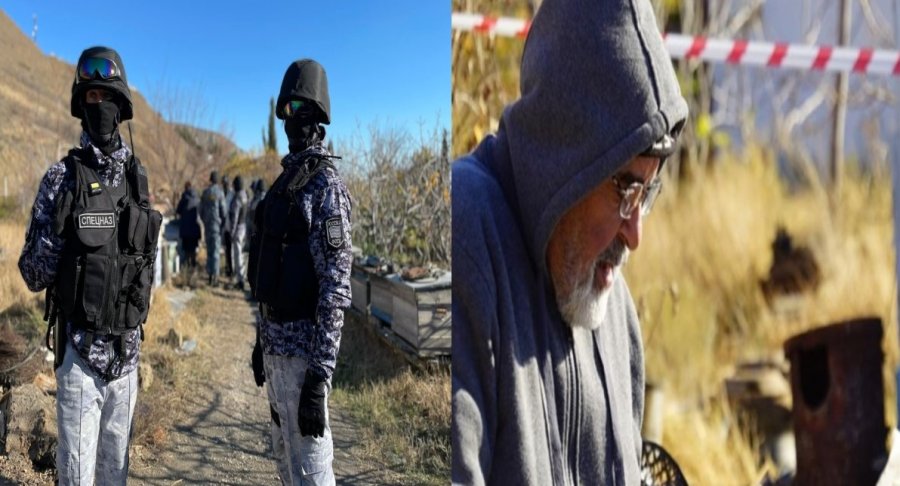War Crimes for the Hague: Russia razes home of elderly Crimean Tatar veteran activist to the ground

Rustem Useinov, a 66-year-old veteran of the Crimean Tatar national movement, did not see his home and garden razed to the ground by Russian occupiers on 24 November, but only because he had become dangerously unwell and been taken to hospital. Neither the fact that the 66-year-old was suffering from pneumonia (and had, reportedly, only been discharged from hospital the previous day), nor the approaching winter prevented the occupiers from wantonly destroying the home he had built and lived in for over two decades. Russia has demonstrated over and over again that those who oppose its invasion and annexation of Crimea can expect harassment and persecution, and the demolition of Useinov’s home was almost certainly in reprisal for his refusal to look away when other Crimean Tatars are imprisoned on fabricated charges.
Mykola Kikkas, lawyer from the Regional Centre for Human Rights, believes that Russia’s demolition of Useinov’s home can be considered a war crime regardless of the excuses provided. Russia is an occupying state and is prohibited by international law from destroying property except in cases of military necessity.
It seems that the Sudak occupation administration applied to the local ‘court’ in summer for Useinov’s occupation of the land to be declared illegal. Useinov only learned after the supposed ‘court hearing’ on 3 August that the Sudak city ‘court’ had ruled that the land was illegally squatted. He immediately lodged an appeal which has not been heard, meaning that even by their own illegally applied laws, the Russian occupiers had no right to take any action.
Other Crimean Tatars may now also be in danger of losing their homes. It must be said that successive Ukrainian governments bear considerable responsibility for the situation that Russia is now using to its own ends. The Crimean Tatar people lost everything in 1944, and although invited to return to independent Ukraine, no proper measures were ever taken to ensure compensation for what had been taken from them, or at least allocation of plots of land and proper facilities in order to rebuild their lives back in their homeland. After deporting the Crimean Tatars, and some other ethnic groups, Stalin moved a lot of Russians to Crimea, with this probably one of the reasons why the Crimean Tatars who returned, faced such obstruction from the local authorities. Under these circumstances, many were forced to simply occupy unused land and build on it. In Useinov’s case, he had been trying, since 2002, to legalize the land, and house and garden that he had created, but with no success.
In December 2014, Sergei Aksyonov, the marginal pro-Russian politician installed as Crimean leader by armed Russian soldiers without insignia, threatened demolition of structures built on such formally squatted land. He claimed, however, that they would not “of course” demolish homes where families are living.
The demolition of Rustem Useinov’s home has demonstrated that this assurance, like all those given by the Russian occupiers and their local puppets, was a lie. Elmaz Qırımlı witnessed the demolition from outside the courtyard and reports that everything was destroyed – the house and other structures, and the surrounding garden. The bailiffs, she says, did not even bother to take some of the elderly man’s clothes out of the house before it was razed to the ground, nor did they make any effort to ensure that Useinov’s two dogs and cat, all of whom were terrified and had no idea what was happening, were safely away from the heavy equipment destroying the home. She saw the cat, in panic, leaping from the wall of the house right in the way of the excavator.
While the FSB took a video of the demolition, police videoed those, like Elmaz, who had come to show their solidarity with Rustem Useinov.
It is almost certainly no accident that the occupiers began with Useinov. The veteran of the Crimean Tatar national movement has, on many occasions, spoken out against Russian repression. Radio Svoboda’s Crimean Reality site reports that he is a member of the Sudak Regional Council of Elders, a civic association which publicly protested in 2017 against the persecution of Mejlis leaders Akhtem Chiygoz and Ilmi Umerov, as well as against the sentence passed on Crimean journalist Mykola Semena. Useinov attends Crimean Solidarity meetings and takes part in various flash-mobs, etc., as well as coming to the courts where political trials are taking place. This may not sound very much, however essentially no more was needed on 23 November for the Russian enforcement bodies to detain 32 Crimean Tatar men and women. Five women were held under the following day’s ‘court hearings’ in custody, while the others were released in the early hours of 24 November. Shortly after the destruction of Rustem Useinov’s home, 21 other Crimean Tatar men, including five journalists carrying out professional duties, were jailed for up to 14 days and 9 women fined.
In 2017, Useinov stated that “there are not such a huge number of us Crimean Tatars. It’s very easy to physically destroy us. For the huge Russian state that is not a problem. It’s possible to destroy, but nobody has yet managed to subjugate us. I think that this will continue to be the case”.
Refat Chubarov, Chairperson of the Mejlis (or self-governing body) of the Crimean Tatar people says that the occupation authorities could have easily resolved the issue with the land on which Useinov’s home was standing.
“Of course this is a form of revenge. Rustem was warned several times not to take an active stand. He has no business nor car that they could take away. All that he had, all that they could take away, was his home.”





